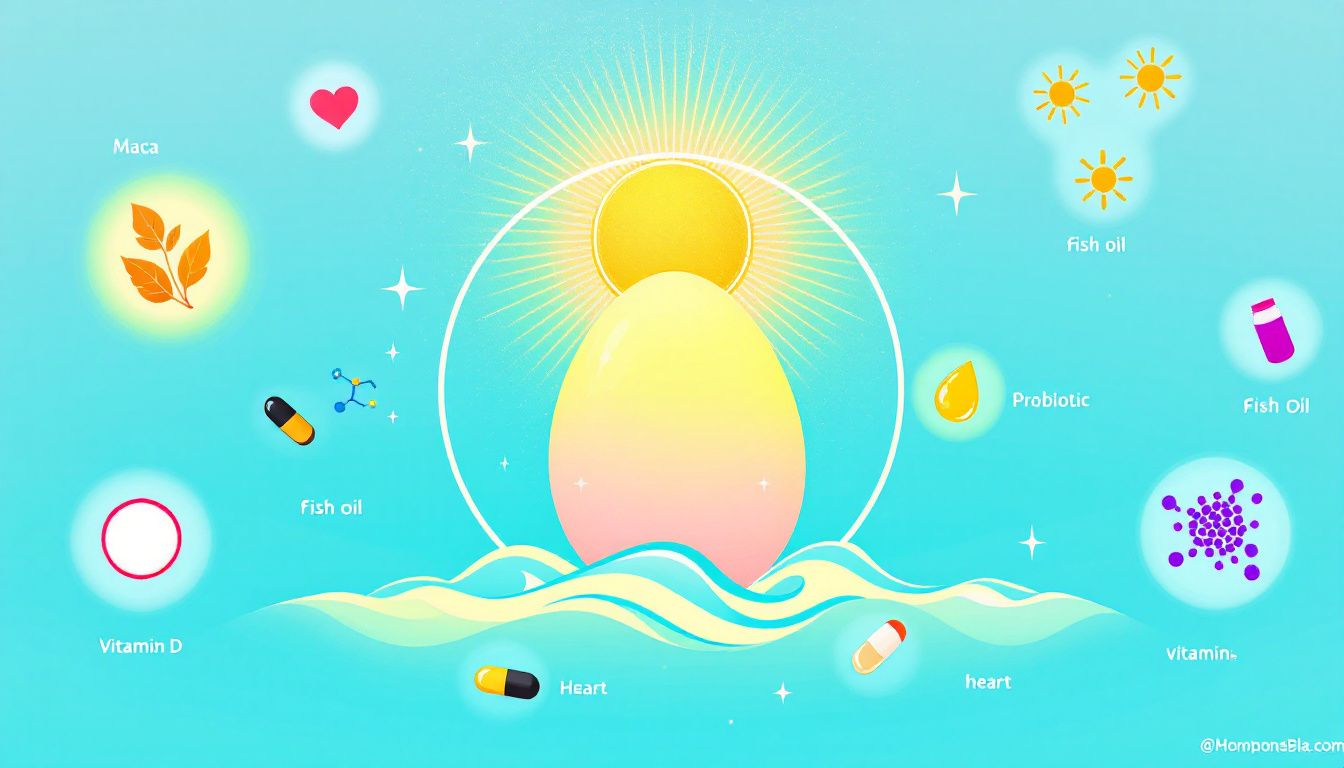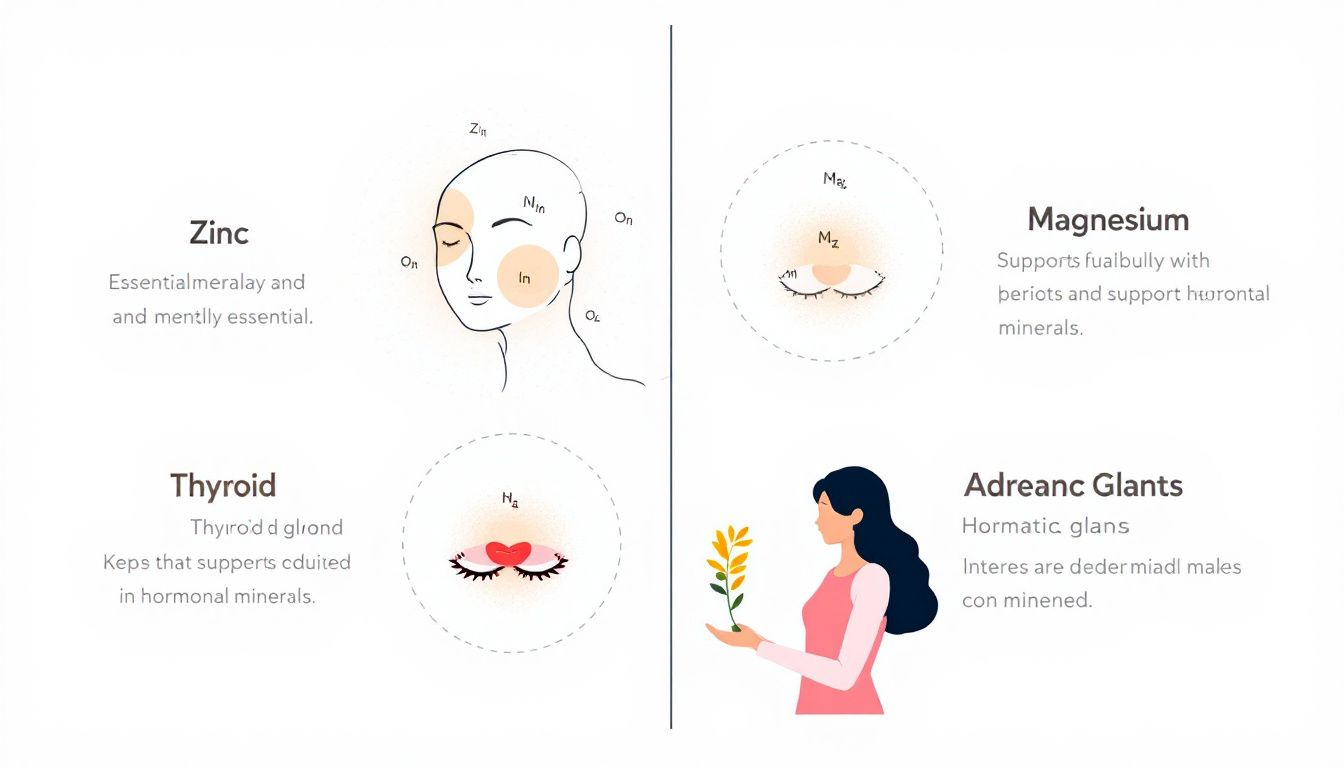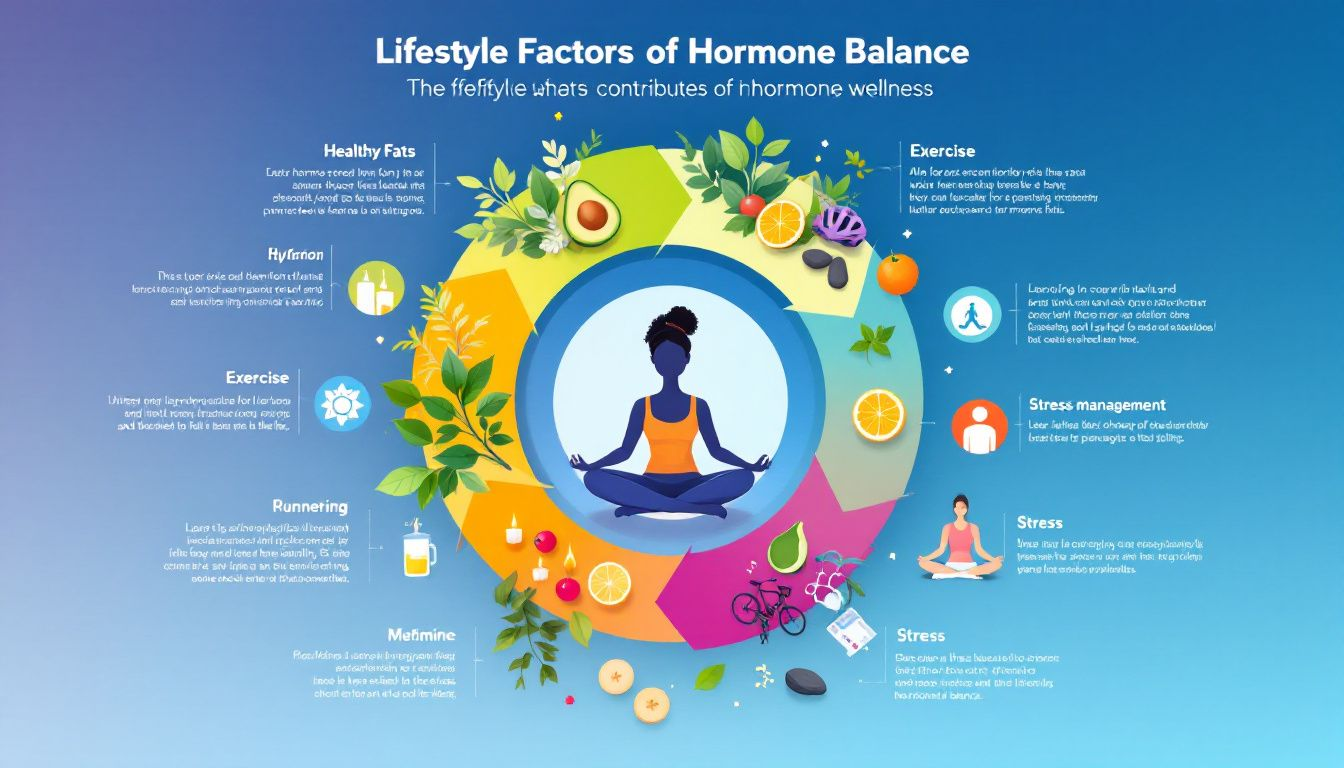Hormonal health is critical in nearly every aspect of your well-being, from energy levels and mood stability to weight management and immune function. Yet, achieving and maintaining hormone balance can feel like an uphill battle, especially with factors like chronic stress, poor diet, and environmental toxins affecting your hormone levels. Whether you’re grappling with irregular periods, mood swings, or menopausal symptoms, understanding how essential nutrients and targeted supplements can alleviate symptoms is key to unlocking your entire hormonal balance. This article is your comprehensive guide to exploring the best supplement for hormone balance, helping you address hormonal challenges with scientifically supported solutions.
From essential vitamins like Vitamins D, B, and C that play a pivotal role in hormone production and regulation to critical minerals like magnesium, zinc, and iodine that affect hormones and thyroid health, we’ll dive into the nutrients your endocrine system needs. Additionally, we’ll explore the powerful impact of omega fatty acids and herbal supplements like Ashwagandha and Chasteberry, known for their ability to regulate hormones and reduce insulin resistance. If you're seeking dietary solutions to support your endocrine system and alleviate symptoms of hormonal imbalance, you’ve come to the right place. Let’s journey into the world of hormone-balancing supplements and uncover the path to optimal health and vitality.
Key Takeaways
- Key vitamins for hormone balance include Vitamin D, B, and Vitamin C, which support hormone production and regulation.
- Essential minerals like magnesium, zinc, and iodine are vital for hormonal health, affecting thyroid function and overall balance.
- Herbal supplements such as Ashwagandha, Chasteberry, and Black Cohosh Root can help manage hormonal imbalances and alleviate related symptoms.
Key Vitamins for Hormone Balance

Vitamins are crucial for regulating hormone levels and overall hormonal health. Vitamins D, C and B are key to maintaining this balance.
Here’s how each of these vitamins contributes to hormonal wellness.
Vitamin D
Vitamin D is not just a vitamin; it is a pivotal hormone in maintaining hormonal balance and overall health. This essential nutrient aids in producing key hormones, including insulin and sex hormones like estrogen and testosterone. Adequate Vitamin D levels are vital for reproductive health, metabolic function, and regulating hormones such as progesterone and insulin, critical for maintaining a healthy endocrine system. Without enough Vitamin D, hormone regulation can falter, leading to issues like insulin resistance, irregular periods, and mood swings.
Key dietary sources of Vitamin D include fatty fish, egg yolks, and fortified foods like milk and cereals. These foods can help reduce the risk of vitamin D deficiency, often associated with hormonal challenges such as excess estrogen or imbalanced thyroid hormones. However, diet alone is not enough for many individuals to meet their Vitamin D needs, particularly if they are experiencing hormonal imbalance or have limited access to sunlight.
Sun exposure is one of the most natural and effective ways to boost Vitamin D levels, as your skin synthesizes this hormone when exposed to UVB rays. Spending time outdoors, especially during the morning or midday, can significantly improve your body’s ability to regulate hormones and promote optimal health. However, achieving adequate sun exposure can be challenging for those living in regions with limited sunlight, particularly during winter. Seasonal changes, high stress levels, and busy schedules can all affect your ability to soak up the sun.
Vitamin D supplements are invaluable for supporting hormonal health in these cases. High-quality dietary supplements can ensure you maintain healthy levels of this essential nutrient, especially for postmenopausal women, individuals experiencing significant mood swings, or those struggling with chronic stress. By combining a healthy lifestyle, a balanced diet, and targeted supplementation, you can better regulate hormones, support your thyroid gland and adrenal hormones, and achieve full hormonal balance year-round.
B Vitamins
B vitamins are essential for hormone regulation, with specific roles played by B12, B6, and B3. For instance, Vitamin B6 helps regulate estrogen levels and alleviate PMS symptoms, making it a cornerstone for women’s hormonal health. Similarly, Vitamin B12 is crucial for thyroid function and can influence the development and management of thyroid disorders. These vitamins also support the adrenal glands, producing stress hormones and promoting a balanced nervous system.
A deficiency in B vitamins can disrupt hormone regulation, leading to poor thyroid function and an increased risk of hypothyroidism. For example, low levels of Vitamin B12 can affect the thyroid gland's ability to produce thyroid hormones, impacting energy levels and metabolism. Incorporating B vitamin-rich foods like eggs, meat, fish, and leafy greens into your diet can help maintain optimal health. However, vegans and vegetarians, who may have limited access to natural sources of B vitamins, should consider vitamin B supplements to meet their nutritional needs and support hormone health.
To help you find the best option for boosting your B vitamin intake, check out our article, “Everything You Should Look for In a Vitamin B Complex Liquid Supplement.” This detailed review introduces five of the top liquid Vitamin B Complex supplements available on Amazon, offering insights into their benefits, formulations, and quality. Whether you're seeking dietary solutions for hormonal balance or want to enhance your overall health, this guide can point you toward the right product to meet your needs.
Vitamin C
Vitamin C is a powerful antioxidant that plays a significant role in supporting hormone production and mitigating symptoms associated with hormonal imbalances. By reducing oxidative stress and inflammation, Vitamin C helps regulate hormone levels, including stress hormones like cortisol. This nutrient is particularly beneficial for maintaining a healthy endocrine system and supporting the adrenal glands during chronic stress or hormonal challenges. Citrus fruits, strawberries, and other Vitamin C-rich foods are excellent sources of this essential nutrient.
To explore the best ways to meet your Vitamin C needs, check out our article “Your Guide to the Best Supplement for Vitamin C: Making Sense of Your Options.” This comprehensive guide reviews five of Amazon's top Vitamin C supplements, offering detailed insights into their quality and benefits. Whether you’re looking to enhance hormone health or save time finding the right supplement, this resource provides everything you need to make an informed decision.
Essential Minerals for Hormonal Health

Certain minerals, like vitamins, are essential for maintaining hormonal balance and optimal body function. Magnesium, zinc, and iodine are vital for hormone production and regulation.
Here’s how each of these minerals contributes to hormonal health.
Magnesium
Magnesium is essential for the production and secretion of thyroid hormones and hormones like testosterone, DHEA, progesterone, and estrogen. This mineral plays a critical role in maintaining hormonal balance, and insufficient magnesium levels are often linked to issues like insulin resistance and elevated testosterone levels in women with PCOS. Proper magnesium intake addresses these hormonal challenges and supports overall endocrine health.
Stress significantly depletes magnesium levels, further impacting hormone regulation and contributing to symptoms like fatigue and mood swings. Consuming magnesium-rich foods such as dark leafy greens, seeds, and nuts can help replenish your magnesium stores and support hormonal health.
For those seeking additional supplementation, check out our article “Magnesium Marvels: Discover the Five Best Magnesium Bisglycinate Chelate Supplements for Your Wellbeing.” This guide reviews five of the top magnesium supplements available on Amazon, offering insights into their benefits, quality, and effectiveness. It’s a valuable resource to help you find the right supplement to complement your diet and maintain hormonal balance.
Zinc
Zinc plays a vital role in hormone regulation, influencing critical hormones such as insulin and thyroid hormones, including TSH (thyroid-stimulating hormone) and TRH (thyrotropin-releasing hormone). A zinc deficiency can disrupt hormone regulation, leading to growth, reproduction, and overall endocrine health issues. Zinc is essential for maintaining optimal health and addressing hormonal imbalances by supporting processes like hormone production and regulation.
Add zinc-rich foods like meat, shellfish, and legumes to enhance your zinc intake. Additionally, zinc supplements can be particularly effective in improving blood sugar management and insulin sensitivity. To dive deeper into the best zinc supplements, explore our article “The Health Enthusiast's Dream: Five Of The Best Zinc Selenium Supplements You Need to Know.” This detailed review highlights five of the top zinc and selenium supplements available on Amazon, offering valuable insights to save you time and help you make informed decisions about supporting your hormonal health.
Iodine
Iodine is a critical nutrient for producing thyroid hormones T3 and T4, which are key in regulating metabolism and overall hormonal health. An iodine deficiency can lead to hypothyroidism, characterized by reduced levels of T3 and T4 and resulting in hormonal imbalances within the thyroid gland. Proper iodine intake is essential for maintaining thyroid function and avoiding weight gain, fatigue, and disrupted hormone levels.
Incorporating iodine-rich foods like seaweed, iodized salt, and seafood into your diet effectively supports thyroid health. However, for a more in-depth understanding of iodine's importance in hormonal health, explore our article “Unlock Better Thyroid Health: The Best Supplement for Iodine Explained.” This comprehensive guide delves into the value of iodine for maintaining thyroid function and highlights two exceptional iodine supplements to consider. It’s an invaluable resource for those seeking targeted solutions to improve thyroid health and achieve better hormone balance.
Omega-3 Fatty Acids

Omega-3 fatty acids are essential for maintaining hormone balance and promoting overall health. These healthy fats help reduce insulin resistance, improve blood sugar control by influencing insulin signaling transporters and receptors, and decrease chronic inflammation, which can otherwise disrupt hormone function. A diet rich in omega-3s from fish, walnuts, and chia seeds can improve insulin sensitivity, enhance lipid profiles, and support optimal hormonal health. Including omega-3 fatty acids in your meals is a simple yet powerful way to promote hormonal balance and well-being.
For our vegetarian and vegan readers seeking non-animal sources of omega-3s, check out our article “From Algae to Awesomeness: Five of The Best Vegan Omega-3 Supplements You Need to Know.” This guide highlights five exceptional algae-based omega-3 supplements, offering a complete and sustainable alternative to traditional fish oil. It’s a must-read for anyone looking to support hormonal health while adhering to a plant-based lifestyle.
Herbal Supplements for Hormone Balance

Herbal supplements can significantly aid hormonal balance. Herbs like Ashwagandha, Chasteberry, and Black Cohosh Root help regulate hormones and alleviate imbalanced symptoms.
Here’s how each of these herbs contributes to hormonal health.
Ashwagandha
Ashwagandha is a powerful adaptogenic herb that significantly promotes hormone balance by reducing cortisol levels and stabilizing sex hormones. This makes it particularly effective in alleviating stress-related hormonal imbalances. Additionally, Ashwagandha has been shown to boost testosterone levels, which supports overall hormonal health for both men and women. Its ability to modulate stress hormones like cortisol makes it a valuable tool for those experiencing chronic stress, anxiety, or adrenal fatigue, as it helps restore balance to the endocrine system.
Incorporating Ashwagandha into your herbal supplement routine can significantly support adrenal gland health and overall hormonal balance, making it a key player in addressing hormonal challenges. For a more detailed look at this remarkable herb and guidance on choosing the best product, refer to our article “How Do I Know Which Ashwagandha Is Best? Your Guide to Picking Quality Supplements.” This comprehensive guide explores the top Ashwagandha supplements available and offers insights to help you select the right one for your needs.
Chasteberry
Chasteberry, also known as Vitex, is a powerful herb that significantly promotes hormonal balance, particularly for women. It helps increase progesterone levels, which is essential for menstrual and reproductive health. By reducing prolactin secretion, Chasteberry also aids in regulating hormone levels and addressing issues like irregular periods and premenstrual symptoms. This makes it an invaluable option for women dealing with hormonal challenges such as PMS, mood swings, or fertility concerns.
Traditionally used in herbal medicine, Chasteberry has been valued for centuries for its ability to naturally alleviate symptoms of hormonal imbalances. Modern research supports its efficacy in promoting hormonal balance and improving overall health. By incorporating Chasteberry into your routine, either through dietary supplements or herbal teas, you can address hormonal imbalance gently and effectively. This herb mainly benefits women seeking nutritional solutions to support their endocrine system and reproductive health.
Black Cohosh Root
Black Cohosh Root is a well-known herbal remedy, particularly for managing menopause symptoms like hot flashes, night sweats, and mood swings. This herb interacts with estrogen receptors in the body, mimicking some of estrogen's effects to help alleviate symptoms caused by declining hormone levels. Additionally, Black Cohosh Root reduces luteinizing hormone (LH) and follicle-stimulating hormone (FSH), which often rise during menopause, contributing to hormonal stability.
Incorporating Black Cohosh Root into your supplement routine can relieve menopausal symptoms and support overall hormonal health. This herb is beneficial for postmenopausal women looking for natural alternatives to hormone replacement therapy. Regularly using Black Cohosh Root supplements can improve quality of life during menopause while promoting a balanced and healthy endocrine system. Consulting with a healthcare professional is recommended to ensure its safe and effective use.
Probiotics and Gut Health
Probiotics are crucial in maintaining a balanced gut microbiome, deeply connected to hormone health. A healthy gut supports the regulation of sex hormones like testosterone, progesterone, and estrogen by aiding in the proper metabolism and elimination of hormones. Probiotics also enhance digestion and nutrient absorption, ensuring your body gets the essential vitamins and minerals to produce and regulate hormones effectively. This makes them a cornerstone for achieving hormonal balance and maintaining overall well-being.
While more research is needed to understand the connection between probiotics and hormone health, evidence suggests that improving gut health can significantly impact hormonal stability. High-quality probiotic supplements can help reduce symptoms of hormonal imbalance, such as mood swings and digestive issues while promoting optimal health. Adding probiotics to your daily routine is an easy and effective way to support your endocrine system and cultivate a healthy lifestyle.
Lifestyle Factors for Hormone Balance

A healthy lifestyle is essential for achieving and maintaining hormonal balance. A balanced diet rich in fruits, vegetables, and essential nutrients like vitamins B, C, and D, along with healthy fats and omega-3 fatty acids, supports hormone production and regulation while reducing inflammation. Omega-3s regulate hormone levels and promote healthy fetal development during pregnancy. Incorporating stress-reducing activities such as yoga or meditation, along with maintaining adequate magnesium levels, helps mitigate the effects of chronic stress on the body and supports hormonal health. By prioritizing a lifestyle that includes proper nutrition, regular exercise, quality sleep, and effective stress management, you can address hormonal imbalance and cultivate full hormonal balance for optimal well-being. Remember, dietary supplements should complement, not replace, a healthy diet. Choose high-quality options and consult a healthcare professional to ensure they meet your needs.
In Summary
Hormonal imbalance affects millions of people worldwide, particularly women, impacting their quality of life and overall health. Achieving hormone balance requires a multifaceted, holistic approach that integrates targeted vitamins, essential minerals, omega-3 fatty acids, herbal supplements, probiotics, and lifestyle changes. Key nutrients such as Vitamin D, B vitamins, magnesium, zinc, and iodine play pivotal roles in hormone production and regulation, while omega-3 fatty acids reduce inflammation and improve insulin sensitivity. Herbal supplements like Ashwagandha, Chasteberry, and Black Cohosh Root offer natural ways to alleviate symptoms of hormonal challenges, including menopausal symptoms, mood swings, and irregular periods.
A balanced diet rich in healthy fats, vitamin C-rich foods, and nutrient-dense options like fatty fish and leafy greens provides the foundation for hormonal health. Incorporating stress-reducing practices like yoga or meditation and prioritizing gut health through high-quality probiotic supplements supports the endocrine system and fosters full hormonal balance. This comprehensive approach addresses specific hormonal challenges and promotes optimal health, immune function, and mental well-being.
As more people seek natural dietary solutions to regulate hormone levels, it’s clear that a proactive, informed approach can make a meaningful difference. Whether managing thyroid hormones, reducing insulin resistance, or alleviating symptoms of adrenal or postmenopausal imbalances, combining dietary supplements, essential nutrients, and a healthy lifestyle can unlock the path to long-term hormonal health. By embracing these strategies, individuals can take control of their hormone health and achieve a balanced, vibrant life.
Brief Answers to FAQs
Why is Vitamin D essential for hormone balance?
Vitamin D is crucial for hormone balance as it functions like a hormone itself and helps regulate key hormones such as estrogen, progesterone, and insulin. Ensuring adequate Vitamin D levels can support overall hormonal health.
What role do B vitamins play in hormonal health?
B vitamins, especially B12, B6, and B3, are crucial for maintaining hormonal balance and supporting thyroid function, influencing overall hormonal health. Ensuring adequate intake of these vitamins can positively impact your hormonal regulation.
How do omega-3 fatty acids support hormonal balance?
Omega-3 fatty acids support hormonal balance by reducing inflammation and enhancing insulin sensitivity, vital for maintaining healthy hormone levels. Prioritizing omega-3 intake can thus contribute significantly to overall hormonal health.
Can herbal supplements like Ashwagandha help with hormone balance?
Ashwagandha can support hormone balance by reducing cortisol levels and stabilizing sex hormones. Incorporating it into your wellness routine may promote overall hormonal health.
How do probiotics contribute to hormone balance?
Probiotics contribute to hormone balance by promoting a healthy gut microbiome that interacts with sex hormones, thereby supporting overall hormonal health. Regular intake can be beneficial for maintaining hormonal equilibrium.
Thanks for taking this journey to explore the best supplement for hormone balance. If you want to add to your library of knowledge and are interested in exploring some of the supplements mentioned in this article, you should check out the links above. It could be a huge time-saver - you won't be sorry you took a look.
Also, please return soon to check out our next review of other incredible supplements – we’re always looking out for YOU!
*We are NOT qualified medical advisors. The content here is only based on our personal opinions and research and should NOT be used as a substitute for a healthcare professional's advice!











Member discussion